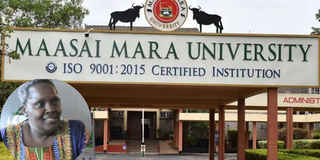How Maasai Mara University heist case became an abuse of court process

Former Maasai Mara University Vice Chancellor Prof Mary Walingo (Inset).
What you need to know:
- The arrest and prosecution of Ms Walingo and four others over the misappropriation of Sh177 million from the university, followed an explosive expose that was aired by a local media house, where a whistleblower, Mr Spencer Sankale, gave a shocking account of how the officials siphoned money from the university coffers.
- Following the poor coordination by the respective agencies, the evidence tabled in court was marred with gaps and discrepancies such as the glaring difference between the figures quoted in the charge sheet and the exact evidence tabled in court.
The termination of criminal charges against former Maasai Mara University vice chancellor Mary Walingo and her co-accused after their highly publicised arrest has left the investigating agencies with an egg on the face.
The arrest and prosecution of Ms Walingo and four others over the misappropriation of Sh177 million from the university, followed an explosive expose that was aired by a local media house, where a whistleblower, Mr Spencer Sankale, gave a shocking account of how the officials siphoned money from the university coffers.
After what the Directorate of Public Prosecutions termed as thorough investigations into the matter by a team of detectives and prosecutors, he on August 24, 2020, ordered for the arrest of the five exhibiting confidence that there was overwhelming evidence to secure a conviction.
Implicated in the scandal were prof Walingo, the Deputy Vice-Chancellor in charge of Administration Somon Kasaine Ole Seno, Deputy Vice-Chancellor in charge of Finance and Planning John Almadi Obere, Former acting Deputy Vice-Chancellor of Academic and Student affairs Anacklet Biket Okumu and Vice Chancellors Driver Noor Hassan Abdi.
The five senior public officers were accused of conspiring to misappropriate Sh 177,007, 754 from the university on diverse dates between January 24, 2016, and July 19, 2019.
But 27 months later, a Nakuru Court has thrown out the case citing poor execution of investigations and presentation of the case with the blame falling squarely on the two investigative agencies the DCI and DPP.
Abuse of power
From the judgment, one agency was overzealous in the work, while the other exhibited no competence leading to an overlap of functions.
The police, specifically the DCI for instance, for questionable reasons, overstepped their mandate by usurping the powers of the DPP to take up the role of the investigator and the prosecutor.
According to Justice Hillary Chemitei, the DCI made the decision to charge, drafted the charge sheet and signed them contrary to the law.
The decision by the Officer Commanding Station Nakuru Central Police Station to sign the charge sheet was part of the irregularities, that contributed to the rendering of the charge sheet defective- the main reason the case was terminated.
Justice Chemitei argued that the role of the police ought to have ended at the investigations where they were supposed to submit the report to the ODPP for further action.
“The net effect was that there was an obvious crossing of lanes, so to speak, which the constitution did not envisage and which the court is mandated to correct. In essence, there was abuse of power by the police as thought to have followed proper protocols,” noted Justice Chemitei.
Furthermore, the court found that the prosecution was not allowed to express their mandated discretion which is evidenced by lack of their concurrence with the police.
According to the court, the investigators mainly relied on the evidence of the media expose dubbed “Mara heist” which prompted them to act.
Following the poor coordination by the respective agencies, the evidence tabled in court was marred with gaps and discrepancies such as the glaring difference between the figures quoted in the charge sheet and the exact evidence tabled in court.
And the shoddy investigations prompted the court to question the motive of the agencies to rush to charge the four suspects.
Justice Chemitei in his judgement allowed the review application filed by Prof Walingo dated December 22, 22 seeking to quash the charges and criminal proceedings at the trial court.
The judge termed the charges sheet defective because the amount of money, which was alleged to have been lost did not tally with the evidence that was produced in court.
According to the court, there were no sufficient forensic investigations done and if they were done it was done in a hurry to satisfy some third parties or some ulterior motives.
“The same did not meet the threshold for charging the petitioner and her colleagues in such a serious matter based on fraud and conspiracy,” stated Justice Chemitei
The judge found there were serious loopholes in the evidence provided by the prosecution which made the evidence fail to meet the threshold to sustain the charges.
“In the premises, this court is not persuaded that the petitioner and the interested parties conspired to steal the alleged funds from the Maasai Mara University. If for any chance the court was to allow the prosecution to proceed then it will be condoning an abuse of court process and subjecting the petitioner and interested parties to unnecessary litigation,” noted Justice Chemitei.
Following the expose and subsequent arraignment of the suspects Prof Walingo who was suspended successfully challenged the decision before she was reinstated and awarded compensation for unfair administrative action.
Mr Sankale was on the hand appointed last year as a member of the Tax Appeals Tribunal for a term of three years by Chief Justice Martha Koome.





